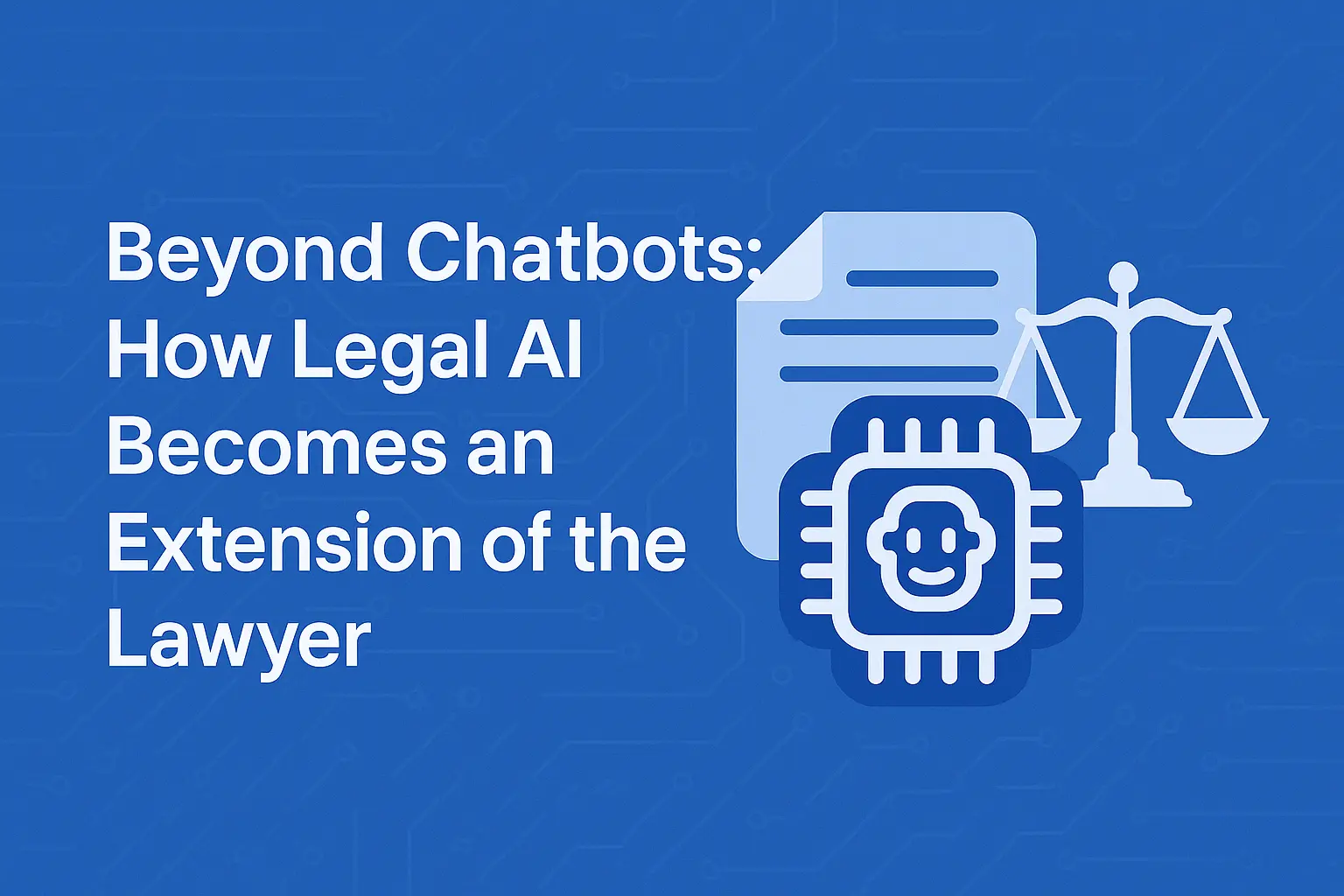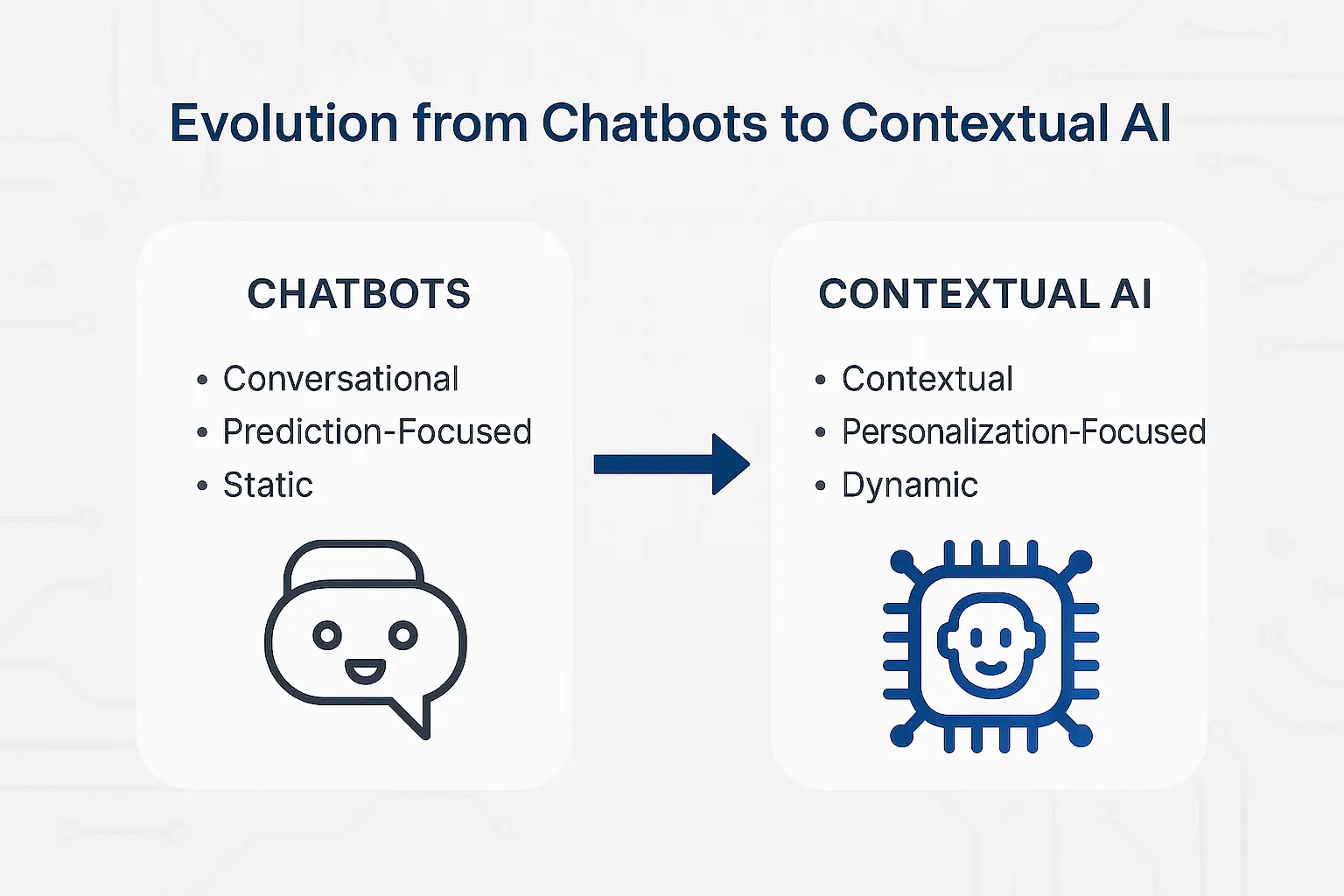
Beyond Chatbots: How Legal AI Becomes an Extension of the Lawyer
The legal industry doesn't need another chatbot.
It needs systems that work the way lawyers think tools that understand precedent, adapt to drafting style, and reinforce firm standards of quality and tone.
The next wave of Legal AI isn't conversational; it's contextual.
And it's redefining knowledge management from static repositories to personalised, infrastructure-driven systems that extend the lawyer's own expertise.
Key Takeaways
- AI is moving from chat to context. The future of Legal AI is personalisation, not prediction.
- Knowledge management becomes dynamic. Information is organised around how each lawyer works.
- Search turns into understanding. AI retrieves meaning, not just matches.
- Infrastructure defines capability. Context and governance, not chat, power performance.
- Qanooni principle: Personalisation without exposure — your firm's data never trains the model.
Why Chatbots Are Not Enough
Most legal "AI assistants" are built around conversation, not comprehension.
They can answer questions but can't adapt to a partner's tone or reasoning style.
They forget context and have no memory of how your firm drafts or argues cases.
That's because most chatbots are thin layers over generic models.
They rely on third-party infrastructure and lack the governance, context, and compliance that legal work demands.
In short, they talk but they don't adapt.
From Conversation to Context
Knowledge in law isn't just data; it's context.
The real value lies in how lawyers interpret, apply, and personalise it.
To make AI genuinely useful, it must understand how a firm structures information and how each user prefers to interact with it.
Qanooni achieves this through configurable context layers, not by learning from content.
The system becomes more responsive and personalised as lawyers interact with it, also adjusting interface preferences, retrieval priorities, and drafting suggestions without ever storing, reusing, or training on client or firm data.
AI Knowledge Management in Law Firms
Research from the International Legal Technology Association (ILTA) shows that lawyers spend nearly 35% of their time rediscovering work product that already exists in their firm.
That inefficiency is exactly what contextual AI can solve—if built securely.
According to LawNet UK, mid-market firms are now prioritising knowledge-sharing frameworks that combine AI retrieval with firm-governed data management.
Qanooni's approach aligns with this shift by embedding knowledge retrieval directly within Microsoft 365, keeping both efficiency and data sovereignty in balance.
What Makes AI "An Extension of the Lawyer"
1. Contextual Personalisation
Qanooni adapts to each lawyer's workflow, matter type, and drafting style through configuration and session-level signals.
No model training is involved — it simply remembers session preferences within the firm's secure Microsoft 365 environment.
2. Secure Knowledge Integration
Rather than ingesting or analysing client material, Qanooni indexes existing firm data already stored in Microsoft 365 or SharePoint under firm control.
All context generation happens dynamically during use, governed by firm security and data-access rules.
3. Firm-Grade Governance
Every interaction follows enterprise-grade permissions, encryption, and auditability.
The system aligns with UK GDPR and SRA confidentiality principles, ensuring the firm maintains total control over its knowledge and metadata.
4. Human-Centred Intelligence
AI doesn't learn, it responds better over time.
Usage insights, such as which templates are accessed or which clauses are reviewed most frequently, help Qanooni surface relevant content faster - all within firm-approved boundaries.
Why Knowledge Management Needs Infrastructure, Not Apps
The problem with traditional knowledge systems isn't lack of content—it's lack of connection.
Documents and precedents sit in silos across DMS, intranets, and emails, making firm knowledge harder to access and apply.
Qanooni's infrastructure connects those systems securely through Microsoft 365 and SharePoint APIs — building a single, governed knowledge layer that's always in sync with how lawyers actually work.
Nothing is extracted or retained outside the firm's own environment.

Real-World Example: From Queries to Context
A London-based litigation team wanted to speed up the preparation of case summaries.
Their previous chatbot tool could summarise facts but lost context between sessions.
With Qanooni, the system used metadata already stored in Microsoft 365 to recognise matter type, jurisdiction, and preferred style, helping lawyers produce consistent drafts faster.
No data was transferred, stored, or learned from; the personalisation occurred through context configuration and usage metadata alone.
Infrastructure + Personalisation = Leverage
The future of legal AI isn't about prompting—it's about alignment.
A lawyer shouldn't need to explain their drafting approach each time.
With the right infrastructure, AI can reflect the firm's structure and standards whilst keeping data private and untrained.
This is how AI knowledge management in a law firm becomes a productivity amplifier rather than a data risk.
How Qanooni Enables This Shift
Qanooni embeds personalisation safely through its architecture:
- No model training on firm data. Contextual responses are generated in real time using configuration and access signals.
- Data sovereignty. Everything happens inside the firm's Microsoft 365 tenant.
- Security-first by design. ISO 27001, SOC 2 Type II, and UK GDPR alignment.
- Adaptive experience. Session and user-level preferences tailor workflows — never data content.
These controls ensure Qanooni behaves like a trusted assistant always personal; never exposed.
The Takeaway
Chatbots answer.
Infrastructure understands.
The future of Legal AI lies in systems that align with lawyers — not learn from them.
Qanooni's infrastructure-first approach ensures that personalisation never compromises privacy, making AI a true extension of the lawyer, not a replacement.
Learn More
- The Data Stack Behind Legal AI: Why Infrastructure Beats Interfaces
- How Qanooni Keeps Lawyer IP Central and Secure in Microsoft 365
- AI Risk and Regulation: What UK Lawyers Need to Know Before 2026
Frequently Asked Questions
Does Qanooni learn from our firm's data?
No. Qanooni does not train models on any firm or client information. It personalises the experience through usage context, access rules, and configuration.
Can Qanooni adapt to our drafting style?
Yes. It adjusts interface and retrieval preferences based on user interaction—without storing or reusing data outside your Microsoft 365 environment.
Is client data ever shared or retained externally?
Never. All processing and personalisation occur securely within your regional Microsoft 365 tenant.